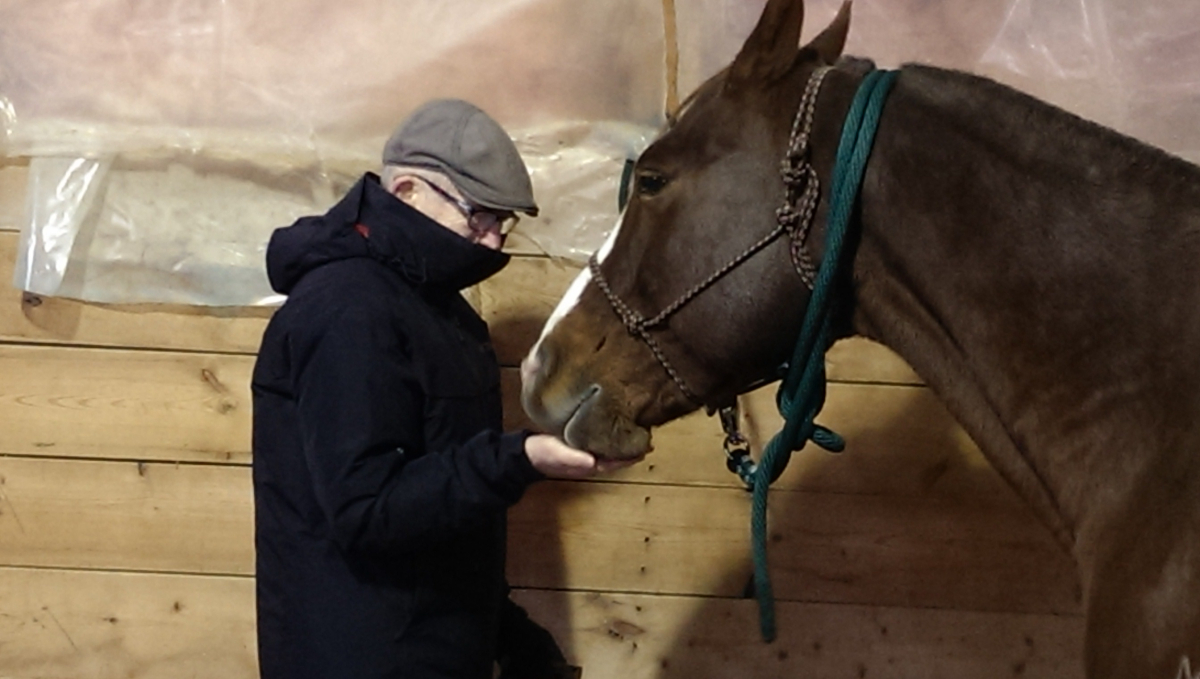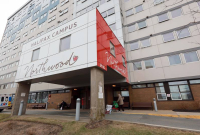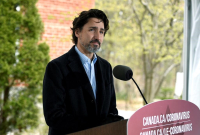Support strong Canadian climate journalism for 2025
On Sunday, May 3, we got the call. My dad had tested positive for COVID-19.
Four days later, on Thursday, May 7, he was dead.
I’m a journalist. And, like most journalists, I try to keep myself out of the story.
But I found myself suddenly and painfully thrust in the middle of this one.
Not at first though.
The story of COVID-19 started trickling into my journalistic consciousness in December, with the first news of a novel virus surfacing in China. My mind went to the days of covering SARS and H1N1, to a story my last team had covered on virus hunters and to the documentary I had commissioned, just a year earlier, on the 100-year anniversary of the Spanish Flu.
Viruses make news. But we were in the middle of covering other, breaking, stories. And, as news works, that virus with the unusual name seemed far away and insignificant at the time.
Over the next months, I watched as the numbers grew. And got closer. The virus made its slow and steady march across the globe to Europe, hitting Italy and Spain, then France and the U.K.
News is, often, about proximity. And this story was still an ocean away.
Canada got its first case in January. But it was just a blip on the news cycle. One man, and then his wife, both of whom had visited the epicentre of the virus in China. A case of improbable bad luck. Nothing more. Or so it seemed at the time.
But the numbers continued to grow. We started covering the story. We started talking about “flattening the curve” and a new hashtag, #COVID-19, was popping up everywhere in my social media feed. I discovered the Johns Hopkins tracking map for the virus. I started checking it every day.
The red dots were getting bigger and closer every time I looked.
Soon, the story of the virus took over our content. We went from 80 per cent climate and environment coverage to 80 per cent COVID-19 coverage.
New York City was slammed. It was the new world epicentre of a virus that kills. We covered the story of bodies being loaded into refrigerated trucks. And I watched video of COVID-19 dead being buried in mass graves on New York’s Hart Island because the morgues were overwhelmed.
The numbers of sick and dying in Canada were on a steady climb. The curve was here.
Proximity.
But my life and the story I was covering were still two separate things.
Then, on March 7, the shadow of the virus started to loom over my own world. My husband and I were on the highway heading to visit my dad in his long-term-care home, an hour away in Kitchener. His birthday present was wrapped with a card and some chocolates (liquor-filled, of course!) in the back of the Jeep. Partway there, we got a call. My dad’s care home was locked down. No more visits.
Still, reality didn’t quite hit. My dad, after all, had tested negative. My dad, after all, was a fighter who had beaten all the odds. Surely, the virus wouldn’t get my dad.
I’d read all the stories about COVID-19. I had read experts advising to take your loved one out of long-term-care homes, that it was going to be bad. Really bad.
But that wasn’t an option for us. My dad needed around-the-clock care. We didn’t have the space or resources to take him home. And that would have meant health-care workers coming every day to look after him. Surely, he was safer and better cared for where he was. Surely, the care home would put all the precautions in place, better than we could. Surely, the virus wouldn’t get my dad.
The days ticked on. My team continued to cover the story. The numbers of infected and dying in Canada grew. Most of them in long-term-care homes.
My dad continued to test negative. Go dad, go!

Then, that call came telling us my dad had tested positive.
That was Sunday.
He was gone by Thursday.
Those four days are burned in my mind.
I shed some tears on Sunday when I got the news dad tested positive. By this time, there were five deaths in my dad’s care home. Seven were infected, including my dad, on his wing of the building.
But I was so used to him pulling through everything, every time. I had a daughter’s impossible optimism. He’ll make it. He always does. He is (was), I always said, “a piece of old shoe leather.”
But one day later, on Monday afternoon, the doctor called my mum for an appointment to see my dad. I knew what that meant. After all, we’d been doing the stories. Only one family member can visit in a long-term-care home. And only once. For end of life.
My mum got to see my dad that Monday night.
Covered in COVID-19 protective gear, she was allowed in the home. She knew, going in, it would be the last time she would see and touch her husband of 65 years. She didn’t say much when she got home, just that his wrist felt very small.
The numbers of infected and dead in dad’s care home were climbing. By now, there were more than 12 sick and seven dead.
Those numbers, so small compared to the thousands and thousands we were reporting in our stories, hit me like a brick.

My dad enjoying a cool, micro-brewery beer on the patio at home. This was the summer of 2018. Photo courtesy of Guy Few.
This seems like a good spot to tell you a bit about my dad.
My dad was a dad to beat all dads. My dad taught me things. He taught me to ski, and to ride a horse, to canoe and play tennis. He taught me to swim and to ride a bike. He taught me to snowshoe, to build a “lean-to” and to read a compass. But while he was teaching me all that, he was wordlessly teaching me something else — to be fearless, and powerful and independent, to be everything and anything I wanted to be and to never, ever think being a girl was less than being a boy.
It might be said too often, by too many, but my dad was my hero. He still is.
For sure, the virus robbed me of my dad. But my dad was 87, and we knew time was short. What it really robbed us of — my mother, sister and brother and I — is a final moment at his side. What we didn’t get — what I always imagined we would get — was holding his hand to his last breath, being there every second as he passed.
Instead, two days after finding out my dad was sick, we had to say goodbye on FaceTime.
On Tuesday, May 5, my mother and my brother and I huddled together on the couch in my mum’s home for the scheduled call. And my sister joined us from her home in Illinois, cut off from us by the border closure between Canada and the US. The team at dad’s care home, covered head to toe in PPE, held the phone at the other end.
By then, my dad was barely conscious. His pain managed through meds. He looked very sick. And it struck me, I’m watching my dad die on FaceTime.
Proximity.
My brother sang “When I Grow Too Old To Dream,” the Sigmund Romberg and Oscar Hammerstein song made famous by Vera Lynn when she sang it for the troops in the Second World War. And he sang “Danny Boy.”
We took turns telling dad stories, reminiscing. My mum cried. And we thanked him. Thanked him for everything he had done for us for all these years. For always being at our side. For being as loyal and solid and steadfast as a man can be. And we told him how much we loved him.
Time condensed — a whole life condensed — into a precious half-hour on a video screen.
And then the half-hour was over. And the screen went blank.
It was sad, and it was lovely, and it was lonely.
But it was also, as my brother said, “a curated goodbye,” where every second and every word counted.

The numbers of infected and dead in Canada continued to climb over the next two days. 4,043 reported deaths on Tuesday, May 5. 4,232 on Wednesday, May 6.
And the numbers were climbing in my dad’s care home, too — 12 dead now.
But my dad hung on.
And there was a whisper of hope in my ear.
On Thursday, May 7, there were 4,408 reported deaths from COVID-19 in Canada.
For me, there was only one.
Allan Thomas Few was born on March 26, 1933, in Saskatoon, Sask. He died at Trinity Village long-term-care home in Kitchener, Ont., on May 7, 2020.
Godspeed, dad.
I’m going to miss you.

The songs my brother sang:
“When I Grow Too Old To Dream,” sung by Vera Lynn
https://www.youtube.com/watch?v=W1vXsbqZnK4
“Danny Boy,” sung by John McDermott







Comments
Thank you for sharing the story of how COVID-19 crept into this chapter of your life and its effect on the family. The article says so much more of how the virus moved and lack of timely action on our governments part.
The paragraphs devoted to your Dad and effect on the family brought tears to my eyes and how tough it is to work through the trip and loss of your Dad.
My heart felt thoughts and prayers for your families health and safety as we continue to work through this Pandemic.
Thanks , Laurie ,written with so much love. He will always be remembered. Thanks to my amazing children for being by my side. Love you forever, Hugs, Mom